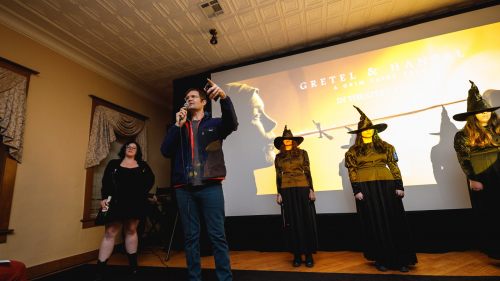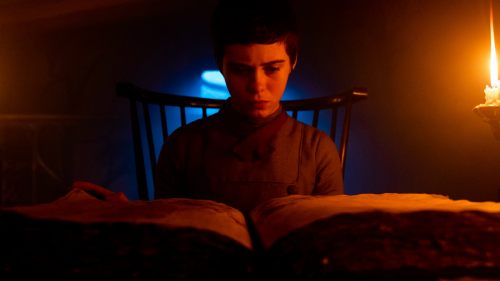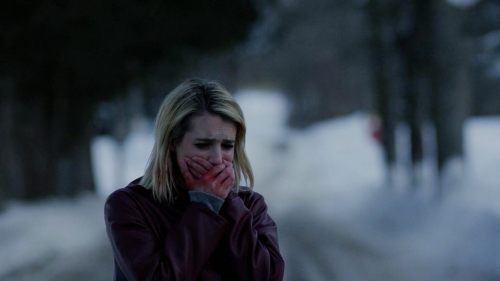The BMD Interview: GRETEL & HANSEL Director Osgood Perkins
Get your tickets to Gretel & Hansel here!
Unlike other recent attempts to revisit Grimm fairy tales through a genre lens, Gretel & Hansel isn't a contemporary revamp or an "edgy" riff — Osgood Perkins' latest effort confronts the folklore head-on; rather than recontextualize the tale, Perkins looks at it through a new(er) set of eyes. Sophia Lillis stars as the eponymous Gretel, who is forced to leave home with her little brother in search of work and food. What they find instead is a reclusive old witch (Alice Krige) with some peculiar proclivities. If you're familiar with the fairy tale (and who isn't?), then you know how this story goes, but Perkins finds ways to make it seem fresh — namely by exploring the relationship between the elder witch and the younger Gretel, and more specifically, the notion of the supernatural/witchcraft as a feminine metaphor.
Gretel & Hansel certainly feels right at (spooky old) home with Perkins' previous films, The Blackcoat's Daughter and I Am the Pretty Thing That Lives in the House, which is just one of the topics we discussed during our recent chat:
Hi, how are you?
I’m gonna make it, Britt.
That’s good to hear. I think that’s the best we can all hope for.
Yeah. [laughs]
The first thing that I wanted to talk about — and the thing that I find most striking — is that all three of your films have had female protagonists. Is there a sort of rhyme or reason to that?
You know, it just sorta happened. Yes, I authored the first two movies, they were deliberately that way and then Gretel & Hansel comes my way and it just happened to be that way, but I think my answer, because I get asked this a little bit is that horror movies for me at their core, elementally, are about what we can’t know about, what we can’t understand. We’re sort of forbidden to see what’s hidden from us, what's too much around the corner or out of our sight or out of our reach. Y’know, what’s not known, and that’s all about death, obviously, and that’s easy to say, but for me I think using the lens of a female protagonist helps me as the director and the writer to sort of stay in that place of not knowing. Y’know?
It’s like, I can only ever really guess at what a female protagonist might be thinking or wanting or feeling or experiencing, it’s not for me to be an expert about. I think that puts me in a beginner's mind about everything, and that really goes for every shot. So every time you’re framing up a shot, if it’s your female protagonist and you're me, you’re wondering, "I wonder what’s she thinking about right now. I wonder what’s going on in her head. I wonder what’s important to her and what she hates." It keeps me in a place of curiosity, a little bit of dread, a little bit of healthy fear which I think we all should feel a little bit of, and it just puts me in that place of trying to discover what’s being hidden from me.
If you had a male protagonist, would that be a little too familiar or bleed into the autobiographical for you?
Yeah, I think it becomes a little too... kind of like I want to be both an expert but I also want to be new to the world, y’know what I mean? I feel like there is the risk of becoming a little complacent or feeling like, oh that main character is me therefore everybody should understand because I understand. But if I’m working with a female protagonist, I have to work to understand and therefore the end result should be richer. As opposed to... there’s no automatic pilot. There’s no moment where I’m just flying the plane over the ocean and my hands are off the controls. I’m always gripping the controls.
The horror genre has this rich history of using the supernatural – and witchcraft in particular – as a metaphor for coming of age or self-discovery, and all three of your films explore similar territory. I could ask if that's something you're drawn to, but it seems like you clearly are.
Well, it’s funny because... I don't know how this is going to be received, but I’ll just go for it, what the fuck. [laughs] This is, like, my 15th interview in a row so let's just try it. So, if you take Satanism, for instance – on the surface, everybody automatically assumes you want to kill people and you want to drink blood and you want to be evil and you want to mess shit up. And in reality, it’s not that at all. It’s really more about self-empowerment, like the Satanic bible, you read about that shit and just go take what you fuckin’ want, right? Do what you want to get what you want, and living your life in a way that’s unapologetic and you’re not under anybody’s anything. You are your own everything. The inverse of that being, obviously, most organized religion, where there’s a bigger power and then there’s you and you’re kinda smaller and you’d better fear it or you better... know what I mean? Or you better duck! Look, here comes Jesus, look busy. That sort of quality, right? So in all of this there does seem to me to be a certain kind of... I don’t want to say "power" in evil 'cause I don’t want to send that message. I don’t want people doing bad things. But I do think that there’s a certain romantic quality.
If we go to year one, we talk about the Garden of Eden, right? The least interesting character in that story is Adam. He’s got... I don’t know what the fuck he’s even doing in that story. In that story, the snake and Eve – it’s so good. And it’s so real and it’s so, like – yeah man, the apple, of course you’re gonna fucking eat the apple. It’s the one thing you’re not supposed to do, like what are you gonna do, not do that? It’s like it's obvious, in a way, to say that Eve becomes maligned and it becomes her fault that everything in the world is shit. To me, it’s like Eve and the apple and listening to the snake is like – fuck it, I gave it a try. Fuck it, I saw what it was and this is what it was. I went through what’s real as opposed to Adam, who kinda just cowered. So if you want to be classical about it and classicist about it, I think the temptation that comes with evil means – it’s less about harming somebody else and more about finding out about yourself. Finding out what you want and what you need. There’s a beautiful line in White Oleander, the novel...
I love that book!
I know, right? There’s an especially tense bit where she’s young and she sleeps with the older guy, and the chapter ends with, "and at that moment I realized there’s no such thing as God, there’s only what we want." And I think that that’s about as right as it is. Right? That’s about as true as anything, so there. That’s my answer. It’s potentially polarizing and I’m gonna get in trouble or, I don’t know. You’ll shape it and write it and make me not sound like an insane prick.
I think that's a really interesting way to look at it. I mean, women have been consistently and constantly oppressed by men, and the only reason for that is because men fear our power. They don't want us in a position to recognize or come into our power.
Hell yeah!
So when we look at using the supernatural or "evil" as an allegory for women coming into their power, I think it sort of doubles down on the terror or fear of the unknown.
I think so and I think that if it is that kind of thing of – the collective male agreement is that women are probably smarter, better, faster, more sensitive, tougher, more emotional, more intuitive than we are, therefore, yeah, let’s call them witches, do something about it. And that’s losing its cache fast as it obviously ought to. It should have long ago, but here we are. So yeah, I think I’m saying the same thing you’re saying.
I was also really taken by the dynamic between Gretel and the witch, and the contemporary feel to that relationship.
I think what was important and what Alice Krige, who plays the witch, and I agreed on was this sort of… the difference between something being facile and something being sophisticated. Facile is everything is just one way, everything is either black or white, it’s either left or right, and sophisticated is, like, no – it’s left and it’s right equally and neither one needs to be more than the other and they can both coexist, and they both do coexist. What we wanted, what Alice and I felt was really important, was this quality of – when the witch regards Gretel, she’s both her competition, some kind of threat, but she also sees the promise of something great.
And so she's both really drawn to and attracted to Gretel, and she also really wants to destroy her and I think that’s that quality, of the witch wants to give Gretel power and wants to help her realize herself but at the same time she also really wants to just cut her down. And I think that is very true for some parents, I think it’s true in a lot of relationships, I think it’s true in a lot of dynamics, obviously, that quality of respect and also the need to degrade. Or the desire to partner with someone but also to be better than that person.The desire to take something but also give it. I think that it was important to us that the witch expressed some apprehension and ambivalence about all of this, and that ultimately her appetite, her addiction, was gonna win out, but we wanted to see in her that she also felt something like love or something like appreciation, something like humility, even if she’s supposed to be the most powerful character.
It also speaks to that sophisticated thinking that you clearly don't perceive the witch as a villain.
Yeah, and I’ve said it to other people before, like Darth Vader, right? For me, Darth and Empire Strikes Back, I’m six years old and he says, "I’m your father," is for me probably the moment of my childhood where I got that quality of, "oh right, he’s bad but he doesn’t want to be bad." He’s bad, but he’s also this guy’s dad, and it fed into all sorts of stuff about me and my own dad, his unknowability, the mask that he wore, all of that stuff. But it was so honest and vulnerable and then you connect to that the old adage of "every villain is just the star of their own story," and you can kinda track that one step further and say every villain is the star of their own sad story. So it’s like, as soon as we start to point to the villians and say, "you’re bad," it’s like, yeah they are bad, and they’re also okay, and they’re also justified in their strange way, y’know? And that’s evolved thinking, that takes time. You gotta kinda get to that but I think it’s there to be had if people want to see it that way.
The mythology takes it to a different place than I think a lot of viewers are familiar with, while presenting these new ideas about what this story was or what it could be.
That’s just in keeping with what we were saying – I wanted to make sure the witch was coming from some place that wasn’t just evil, some cardboard evil presence. It was... she’s earned her approach to the world. Her approach to the world is "I gotta eat kids to feel better." Well, what’s that all about? Something happens that makes us the way that we are and I think that’s worth exploring. It’s worth being almost vaguely sympathetic towards in a way – maybe that’s too much, but it’s like the cycle of abuse, right? It’s like the child is abused by somebody who was abused and so the abuser becomes both the abuser and the abused. It’s complex and it’s dark and it’s really sad but it’s life.
The production design is really stunning here – especially the witch's house, which has such a formidable presence. What was the design process like for Gretel & Hansel and how did it compare to your prior films?
The intention going in was to sort of be in our own universe, to be beholden to no one else’s universe, to no one else’s time, no epoch no century or any of that stuff. What I like about fairy tales, is the feeling tht they are their own world. They don’t care about world events or things that are happening, they’re parable, right? They’re instructive, they’re lessons about living and they’re not about context with the outside world. They are their own world, so it really gave us the freedom to sort of say, it’s not the ’20s, it’s not now, it’s not 500 years ago, it’s "no" time. It’s the time of the story. So it gave us a lot of freedom to just do what we like.
So much of making movies, if you have the right department head, so much of it is about what do we like? What do I want to see? What’s my taste like? What’s pretty to me? And you have an army of people at the ready to sort of compose that with you, and my production designer, Jeremy Reed, he built the house and designed that thing from the ground up, built it in a warehouse in Canada and we always talked about it in the most oblique ways. We never talked about it as an 18th century New England farmhouse, we talked about it as a spaceship. And I talked about it like a spaceship in terms of, like, look, she can’t leave this house, she never leaves the house so let’s imagine that the outside world is uninhabitable to her. It’s like another fucking planet, so let’s make the house like a spaceship that’s landed someplace. So as soon as you kinda click into that it just, everything becomes so much richer because you’re coming at it from an oblique angle. My rules were no thatched roofs, no cobbled anything, no villagers with chickens and steaming pots, none of that. That’s all out. As soon as you throw all that out, all this other stuff comes to the fore.



